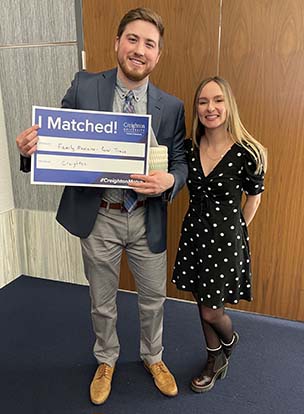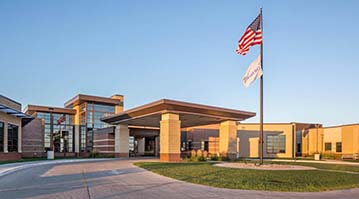
Creighton and CHI Health partner to increase healthcare access in rural NE

Rural medicine isn’t something you do for work. It’s something you live.
It’s an understanding all rural healthcare providers have, including William Meier, MD, Creighton School of Medicine graduate and inaugural resident of the Creighton Family Medicine Rural Training Track (rural track).
Meier’s interest in rural medicine started as an EMT in rural Astoria, Oregon. With mentorship from local physicians, he realized that he, too, could become a rural physician and experience career satisfaction from deeper patient relationships.
“My passion for rural medicine stems from my desire for connection with people and a desire to form lifelong partnerships with people,” Meier explains. "I want to help people accomplish their goals and help them get better and be healthier and happier.”
Getting the rural track off the ground in the first place wasn’t an easy feat – many factors had to fit together like an intricate puzzle for it to come to fruition.
As Creighton's representative in the Rural Health Advisory Committee, the Governor’s task force for rural health in the State of Nebraska, Michael Greene, MD, director of the Family Medicine Residency Program at Creighton University, played a key role in its inception.

"In the task force,” Greene explains, “we discuss healthcare disparities experienced by rural Nebraskans, one of which is the deficiency of primary care doctors."
To address the rural provider shortage, establishing residency programs in rural settings is necessary to train and integrate residents into those communities.
It seems like a simple solution, but the complexities of rural medicine made it challenging to address the healthcare provider shortage. Creighton faced several hurdles, like legislative roadblocks and the lack of academic infrastructure in rural settings.
Specifically, the Balanced Budget Act of 1997 capped Medicare’s funding of residencies and made it nearly impossible to expand programs into areas that needed physicians.
When the COVID-19 pandemic spotlighted rural health inequities, changes were made through the Consolidated Appropriations Act of 2021.
This re-opened Medicare funding, making it possible to build the rural track as an extension of the existing Family Medicine Residency Program. Jyotsna Ranga, MD, associate dean of graduate medical education at Creighton University, says, “It’s important for us to find ways to increase the number of physicians we’re training. This gave us a way to do that.”
Because Creighton University’s academic partner CHI Health has a network of owned and managed facilities across the state and beyond, it became clear that Creighton needed to leverage their connection to launch the rural track.
As David Jones, market president of critical access hospitals and president of Missouri Valley for CHI Health, explains, “Hospitals across the country are navigating higher operating costs, and rural hospitals are no exception. In fact, 43% of rural hospitals around the country are operating in the red. While this is a challenging reality, we are uniquely positioned to thrive, and are doing so in part thanks to strategic partnerships like this one between CHI Health and Creighton. These collaborations are crucial to ensuring continued access of vital healthcare services in underserved communities."

The Family Medicine Rural Training Track was thus established in 2024, welcoming its first resident (Meier), who will split his first year between CHI Health Creighton University Medical Center – Bergan Mercy and CHI Health St. Mary’s in Nebraska City, a rural critical access hospital with the academic infrastructure and physicians needed to support the rural track.
Meier's second and third years will be full-time in Nebraska City, where he will further integrate into the rural community, working with patients of all ages in various settings.
"For me," Meier confirms, "a rewarding part of rural medicine is how integrated into the community you are, how you know the whole family and you take care of multiple generations."
Stacy Blum, MD, site director of the rural track and physician at St. Mary’s, will work with Meier throughout his rural training in Nebraska City. “We were very excited to match with Doctor Meier,” Blum says. “We feel like he really has rural medicine in his heart.”
As a small-town kid herself from Wood River, NE, Blum’s understanding of the healthcare needs in rural Nebraska runs deep.
“We know that 50% of rural physicians are going to retire in the next ten years, and our rural populations are aging,” Blum says. “The need for rural medical care is just increasing and we felt pulled to assist in assuring that we have quality rural physicians to care for our rural communities.”
Meier agrees. “There are some really dedicated physicians and nurses who are doing a ton of work to try to keep these small hospitals afloat,” he shares. “I've known since day one of medical school that I wanted to throw my hat in that ring and help.”




